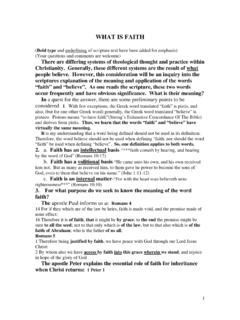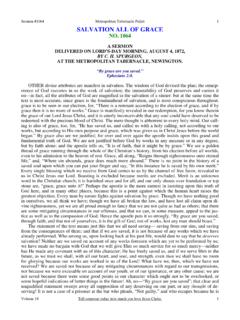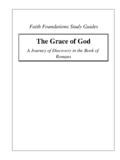Transcription of WHAT IS THE FUNCTIONAL RELATIONSHIP BETWEEN THE …
1 WHAT IS THE FUNCTIONAL RELATIONSHIP BETWEEN . THE LAW, grace AND LOVE. (Your questions and comments are welcome) (Scripture is from KJV and NKJV). (Bold type and underlining in scripture text have been added for emphasis). As a person reads theological commentary, and observes religious practice, that there exists within Christianity widely divergence perspectives of what God is doing with His people and how He is doing it, becomes most evident. Much of this diversity focuses on what affect the death, resurrection and ascension of Jesus Christ had upon the application of God's law to His people. Our approach to this consideration will begin by examining Old Testament scriptures that testify to the law as given by God through Moses, and then enquiring to determine the laws application, if any, to God's children under the New Covenant. First, we will view the commandments as recorded at: Exodus 20. 1. And God spake all these words, saying, 2. I am the LORD thy God, which have brought thee out of the land of Egypt, out of the house of bondage.
2 3. Thou shalt have no other gods before me. 4. Thou shalt not make unto thee any graven image, or any likeness of any thing that is in heaven above, or that is in the earth beneath, or that is in the water under the earth. 5. Thou shalt not bow down thyself to them, nor serve them: for I the LORD thy God am a jealous God, visiting the iniquity of the fathers upon the children unto the third and fourth generation of them that hate me;. 6. And shewing mercy unto thousands of them that love me, and keep my commandments. 7. Thou shalt not take the name of the LORD thy God in vain; for the LORD will not hold him guiltless that taketh his name in vain. 8. Remember the sabbath day, to keep it holy. 9. Six days shalt thou labour, and do all thy work: 10. But the seventh day is the sabbath of the LORD thy God: in it thou shalt not do any work, thou, nor thy son, nor thy daughter, thy manservant, nor thy maidservant, nor thy cattle, nor thy stranger that is within thy gates: 11. For in six days the LORD made heaven and earth, the sea, and all that in them is, and rested the seventh day: wherefore the LORD blessed the sabbath day, and hallowed it.
3 12. Honour thy father and thy mother: that thy days may be long upon the land which the LORD thy God giveth thee. 13. Thou shalt not kill. 14. Thou shalt not commit adultery. 15. Thou shalt not steal. 16. Thou shalt not bear false witness against thy neighbour. 17. Thou shalt not covet thy neighbour's house, thou shalt not covet thy neighbour's wife, nor his manservant, nor his maidservant, nor his ox, nor his ass, nor any thing that is thy neighbour's. 1. In the New Testament we are told that the works of the flesh include adultery, idolatry, and murder-Gal. 5:19-21. And, that they that practice such things shall not inherit the kingdom of God. Also, we are told to put away lying and to speak truth to our neighbor-Eph. 4:25, not to steal-v28, and that no covetous man who is an idolater has any inheritance in the kingdom of God and of :5. Children are told to obey their parents and to Honor thy father and mother; which is the first commandment with promise; That it may be well with thee, and thou mayest live long on the earth -Eph.
4 6:1-3. We are told that we are to cease from our own works as God did from His-Heb. 4:3-11. These scriptures provide clear and unequivocal testimony that the law given through Moses has application in the lives of God's children under the new covenant administration. How it applies is the most pertinent question and will be considered in the discussion that follows. While there are numerous laws that were given to guide the relationships BETWEEN and among the children of Israel, we will view several passages of scripture that reveal the essential nature of these laws. Exodus 21. 28. If an ox gore a man or a woman, that they die: then the ox shall be surely stoned, and his flesh shall not be eaten; but the owner of the ox shall be quit. 29. But if the ox were wont to push with his horn in time past, and it hath been testified to his owner, and he hath not kept him in, but that he hath killed a man or a woman; the ox shall be stoned, and his owner also shall be put to death.
5 30. If there be laid on him a sum of money, then he shall give for the ransom of his life whatsoever is laid upon him. 31. Whether he have gored a son, or have gored a daughter, according to this judgment shall it be done unto him. 32. If the ox shall push a manservant or a maidservant; he shall give unto their master thirty shekels of silver, and the ox shall be stoned. 33. And if a man shall open a pit, or if a man shall dig a pit, and not cover it, and an ox or an ass fall therein;. 34. The owner of the pit shall make it good, and give money unto the owner of them; and the dead beast shall be his. 35. And if one man's ox hurt another's, that he die; then they shall sell the live ox, and divide the money of it; and the dead ox also they shall divide. 36. Or if it be known that the ox hath used to push in time past, and his owner hath not kept him in; he shall surely pay ox for ox; and the dead shall be his own. Exodus 22. 1. If a man shall steal an ox, or a sheep, and kill it, or sell it; he shall restore five oxen for an ox, and four sheep for a sheep.
6 2. If a thief be found breaking up, and be smitten that he die, there shall no blood be shed for him. 3. If the sun be risen upon him, there shall be blood shed for him; for he should make full 2. restitution; if he have nothing, then he shall be sold for his theft. 4. If the theft be certainly found in his hand alive, whether it be ox, or ass, or sheep; he shall restore double. 5. If a man shall cause a field or vineyard to be eaten, and shall put in his beast, and shall feed in another man's field; of the best of his own field, and of the best of his own vineyard, shall he make restitution. In the above referenced scriptures, according to the principle that governs relationships BETWEEN people wherein one person causes loss or detriment to another, justice requires restitution be made to the one suffering loss. The amount of restitution is commensurate with the degree of culpability of the offending party, such as lack of knowledge, or did previous knowledge exist that suggested a particular level of care in the situation, and whether or not the offending party intentionally caused the detriment.
7 These passages inform of the responsibility that rests on each person to live their life in a manner that does not cause detriment to the person, possessions or interests of another. Additional relationships are addressed in the following passage. Exodus 23. 4. If thou meet thine enemy's ox or his ass going astray, thou shalt surely bring it back to him again. 5. If thou see the ass of him that hateth thee lying under his burden, and wouldest forbear to help him, thou shalt surely help with him. 6. Thou shalt not wrest the judgment of thy poor in his cause. 7. Keep thee far from a false matter; and the innocent and righteous slay thou not: for I will not justify the wicked. 8. And thou shalt take no gift: for the gift blindeth the wise, and perverteth the words of the righteous. 9. Also thou shalt not oppress a stranger: for ye know the heart of a stranger, seeing ye were strangers in the land of Egypt. 10. And six years thou shalt sow thy land, and shalt gather in the fruits thereof: 11.
8 But the seventh year thou shalt let it rest and lie still; that the poor of thy people may eat: and what they leave the beasts of the field shall eat. In like manner thou shalt deal with thy vineyard, and with thy oliveyard. 12. Six days thou shalt do thy work, and on the seventh day thou shalt rest: that thine ox and thine ass may rest, and the son of thy handmaid, and the stranger, may be refreshed. 13. And in all things that I have said unto you be circumspect: and make no mention of the name of other gods, neither let it be heard out of thy mouth. The demands of the law in the above passage can be summarized: Consider and regard the interests and needs of our enemies and of those who hate us in the same manner that we show such deference to others. Do not take advantage of those who are poor, nor of those who are innocent and right in their cause. Keep uninvolved in and untainted by any matter in which there is deception. 3. Refuse any gift that could have attached an obligation to the person who gives the gift.
9 Such an obligation will place pressure on the recipient to ignore propriety, and to look away from truth and justice. Be sensitive to the heart of a stranger and treat him or her in an equitable and just manner. Consider the needs of those persons who are disadvantaged, and of those persons who are under one's authority. The sum of these legal requirements is to be just and equitable to everyone and to worship and serve God without defilement. Surely, this is what Jesus had in view when He told His disciples at: Matthew 6. 9. After this manner therefore pray ye: Our Father which art in heaven, Hallowed be thy name. 10. Thy kingdom come, Thy will be done in earth, as it is in heaven. Another passage of scripture that expresses the kindness and patience that God desires in His people: Matthew 5. 38. Ye have heard that it hath been said, An eye for an eye, and a tooth for a tooth: 39. But I say unto you, That ye resist not evil: but whosoever shall smite thee on thy right cheek, turn to him the other also.
10 40. And if any man will sue thee at the law, and take away thy coat, let him have thy cloak also. 41. And whosoever shall compel thee to go a mile, go with him twain. In this passage we see that, while the Lord would have us to be just and equitable to others we should not, personally and individually, be assertive in demanding equivalent consideration and regard from them. Such condescension is abhorrent to the nature with which we have been gifted through Adam's sin- Romans 5:17-21. However, God has made provision in and through the Lord Jesus that we might partake of the Divine nature, and escape self-exalting pride and the other self-serving propensities of the carnal nature-2 Peter 1:2-4. Our heavenly Father is not placing on us a way of life that He has not provided for in His Son, and it is a way of life that His Son walked in here on this earth, as we are told at: 1 Peter 2. 19. For this is thankworthy, if a man for conscience toward God endure grief, suffering wrongfully.









